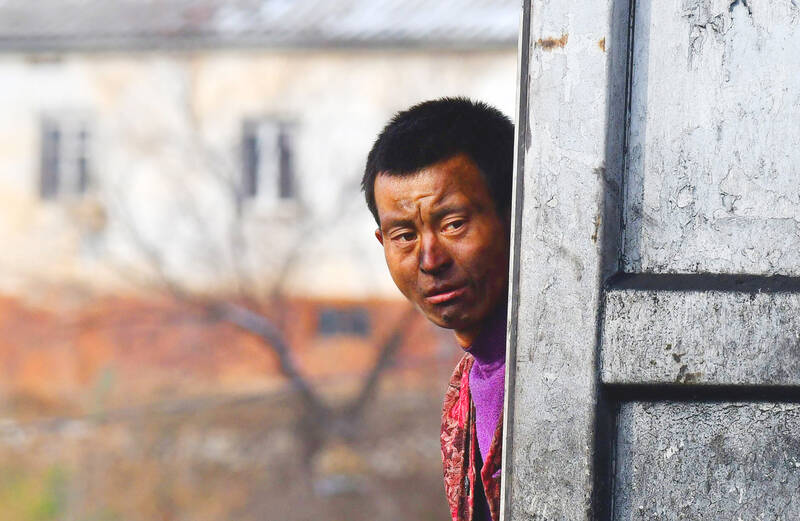Hundreds of meters underground, Emylbek Umarov hacked out lumps of coal by hand with a pickaxe in a dank mine in a remote mountainous corner of Kyrgyzstan.
Coal might be falling out of favor elsewhere because of climate change, but Suluktu’s mines hope growing demand from neighboring Central Asian countries and beyond would help them return to their Soviet heyday.
For some, like Umarov, the mine is one of the few places offering work — despite the threat of accidents that have killed dozens of people in the area in the past few years.

Photo: AFP
“It’s terrifying, it’s tough, but there’s no other work here,” said the 27-year-old, who has two degrees in computing and economics.
As he spoke, the coughing of miners with blackened faces echoed through the tunnels illuminated by a few lamps hanging from a ceiling dripping with water.
The men work with jackhammers, pickaxes and explosives on 12-hour shifts day or night 15 days a month for a monthly salary of less than 150 euros (US$159).

Photo: AFP
Before starting their shifts, they have to travel an hour to the mine in large Russian-made Kamaz trucks along a badly rutted road.
The hulks of Soviet-era machinery could be seen in the pinkish dawn.
Tucked away in the mountains, the town of Suluktu was founded in 1868 and is one of the oldest coal extraction hubs in Central Asia.

Photo: AFP
From the “miner’s bread” on sale in local bakeries to the local soccer team called “Shakhtar” (Miner) — everything in the town is a reminder of its main industry, including the coal dust coating the ground.
The town “heated Central Asia during Soviet times,” Suluktu Mayor Maksat Kadyrkulov said.
Like settlements across the former Soviet Union, it suffered from deindustrialization after its collapse, leading to a sharp drop in population and coal output.
“There is no farmland here. We just dig coal and there is no family without a miner,” Kadyrkulov said.
The mayor said he hoped Suluktu would recover its “past glory” thanks to growing demand for coal.
The Soviet era is a constant presence in the town.
On its outskirts stands a monument depicting two miners with a 4m-high hammer and sickle.
Trucks filled with coal file past the statues on their way to deliver their cargo to Uzbekistan and beyond since access to nearby Tajikistan is now closed off because of a flare-up of tensions along the border.
A mosaic nearby extols the glory of Soviet power, showing a miner with a red star behind him.
Before “we were proud to be miners,” said 64-year-old Nimadjan Abdulayevich, who spent 37 years in the mines, his voice hoarse from throat cancer.
While there have been no fatal accidents in the mine where Umarov works, the risk is constant.
“The mine is like a second front. You risk dying there,” is a phrase that miners often repeat.
Last year, the metal bars holding up the vein where Umarov was working collapsed, breaking his leg.
“Since then, the fear remains,” he said.
His father Dzhumbai, who now works on the surface as a welder, was caught up in a similar accident.
Mine director Kanynbek Ismailov said he lacked the resources for new equipment, even though the conditions in the mine are among the best of the 40 or so in Suluktu.
“We do everything by hand. We do not have new equipment,” Ismailov said.

South Korea’s equity benchmark yesterday crossed a new milestone just a month after surpassing the once-unthinkable 5,000 mark as surging global memory demand powers the country’s biggest chipmakers. The KOSPI advanced as much as 2.6 percent to a record 6,123, with Samsung Electronics Co and SK Hynix Inc each gaining more than 2 percent. With the benchmark now up 45 percent this year, South Korea’s stock market capitalization has also moved past France’s, following last month’s overtaking of Germany’s. Long overlooked by foreign funds, despite being undervalued, South Korean stocks have now emerged as clear winners in the global market. The so-called “artificial intelligence

CONFUSION: Taiwan, Japan and other big exporters are cautiously monitoring the situation, while analysts said more Trump responses ate likely after his loss in court US trading partners in Asia started weighing fresh uncertainties yesterday after President Donald Trump vowed to impose a new tariff on imports, hours after the Supreme Court struck down many of the sweeping levies he used to launch a global trade war. The court’s ruling invalidated a number of tariffs that the Trump administration had imposed on Asian export powerhouses from China and South Korea to Japan and Taiwan, the world’s largest chip maker and a key player in tech supply chains. Within hours, Trump said he would impose a new 10 percent duty on US imports from all countries starting on

Chinese artificial intelligence (AI) start-up DeepSeek’s (深度求索) latest AI model, set to be released as soon as next week, was trained on Nvidia Corp’s most advanced AI chip, the Blackwell, a senior official of US President Donald Trump’s administration said on Monday, in what could represent a violation of US export controls. The US believes DeepSeek will remove the technical indicators that might reveal its use of American AI chips, the official said, adding that the Blackwells are likely clustered at its data center in Inner Mongolia, an autonomous region of China. The person declined to say how the US government received

Like many of us who are mindful of our plastic consumption, Beth Gardiner would take her own bags to the supermarket and be annoyed whenever she forgot to do so. Out without her refillable bottle, she would avoid buying bottled water. “Here I am, in my own little life, worrying about that and trying to use less plastic,” she says. Then she read an article in this newspaper, just over eight years ago, and discovered that fossil fuel companies had plowed more than US$180 billion into plastic plants in the US since 2010. “It was a kick in the teeth,” Gardiner